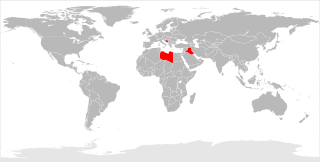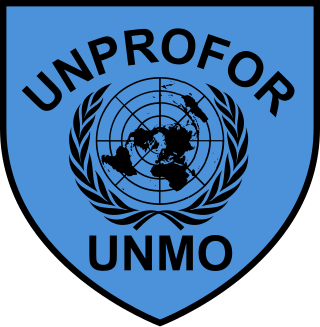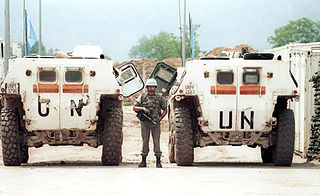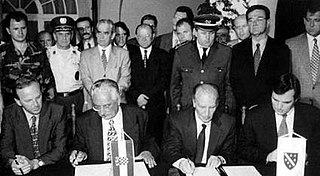
The North Atlantic Treaty Organization (NATO) carried out an aerial bombing campaign against the Federal Republic of Yugoslavia during the Kosovo War. The air strikes lasted from 24 March 1999 to 10 June 1999. The bombings continued until an agreement was reached that led to the withdrawal of the Yugoslav Army from Kosovo, and the establishment of the United Nations Interim Administration Mission in Kosovo, a UN peacekeeping mission in Kosovo. The official NATO operation code name was Operation Allied Force whereas the United States called it Operation Noble Anvil ; in Yugoslavia the operation was incorrectly called Merciful Angel, possibly as a result of a misunderstanding or mistranslation.

A no-fly zone, also known as a no-flight zone (NFZ), or air exclusion zone (AEZ), is a territory or area established by a military power over which certain aircraft are not permitted to fly. Such zones are usually set up in an enemy power's territory during a conflict for humanitarian or military reasons without consent of the enemy state, similar in concept to an aerial demilitarized zone, and usually intend to prohibit the enemy's military aircraft from operating in the region. Military action is employed by the enforcing state and, depending on the terms of the NFZ, may include preemptive attacks to prevent potential violations, reactive force targeted at violating aircraft, or surveillance with no use of force. Air exclusion zones and anti-aircraft defences are sometimes set up in a civilian context, for example to protect sensitive locations, or events such as the 2012 London Olympic Games, against terrorist air attack. A no-fly zone is generally not considered a form of aerial blockade due to its more limited scope compared to an aerial blockade.

The Yugoslav Wars were a series of separate but related ethnic conflicts, wars of independence, and insurgencies that took place from 1991 to 2001 in what had been the Socialist Federal Republic of Yugoslavia. The conflicts both led up to and resulted from the breakup of Yugoslavia, which began in mid-1991, into six independent countries matching the six entities known as republics that had previously constituted Yugoslavia: Slovenia, Croatia, Bosnia and Herzegovina, Montenegro, Serbia, and Macedonia. SFR Yugoslavia's constituent republics declared independence due to unresolved tensions between ethnic minorities in the new countries, which fueled the wars. While most of the conflicts ended through peace accords that involved full international recognition of new states, they resulted in a massive number of deaths as well as severe economic damage to the region.

The Bosnian War was an international armed conflict that took place in Bosnia and Herzegovina between 1992 and 1995. The war is commonly seen as having started on 6 April 1992, following several earlier violent incidents. It ended on 14 December 1995 when the Dayton Accords were signed. The main belligerents were the forces of the Republic of Bosnia and Herzegovina, the Republic of Herzeg-Bosnia, and the Republika Srpska, the latter two entities being proto-states led and supplied by Croatia and Serbia, respectively.

The United Nations Protection Force was the first United Nations peacekeeping force in Croatia and in Bosnia and Herzegovina during the Yugoslav Wars. The force was formed in February 1992 and its mandate ended in March 1995, with the peacekeeping mission restructuring into three other forces.

Operation Deliberate Force was a sustained air campaign conducted by NATO, in concert with the UNPROFOR ground operations, to undermine the military capability of the Army of Republika Srpska, which had threatened and attacked UN-designated "safe areas" in Bosnia and Herzegovina during the Bosnian War with the Srebrenica genocide and Markale massacres, precipitating the intervention. The shelling of the Sarajevo marketplace on 28 August 1995 by the VRS is considered to be the immediate instigating factor behind NATO's decision to launch the operation.

Operation Deny Flight was a North Atlantic Treaty Organization (NATO) operation that began on 12 April 1993 as the enforcement of a United Nations (UN) no-fly zone over Bosnia and Herzegovina. The United Nations and NATO later expanded the mission of the operation to include providing close air support for UN troops in Bosnia and carrying out coercive air strikes against targets in Bosnia. Twelve NATO members contributed forces to the operation and, by its end on 20 December 1995, NATO pilots had flown 100,420 sorties.
The Korićani Cliffs massacre was the mass murder of more than 200 Bosniak and Croat men on 21 August 1992, during the Bosnian War, at the Korićani Cliffs on Mount Vlašić in central Bosnia and Herzegovina.
Operation Sana was the final military offensive of the Army of the Republic of Bosnia and Herzegovina in western Bosnia and Herzegovina and the last major battle of the Bosnian War. It was launched from the area of Bihać on 13 September 1995, against the Army of Republika Srpska, and involved advances towards Bosanski Petrovac, Sanski Most and Bosanska Krupa. At the same time, the Croatian Army and the Croatian Defence Council were engaging the VRS in Operation Maestral 2 further to the southeast. After an initial 70-kilometre (43 mi) advance, VRS reinforcements managed to stop the ARBiH short of Sanski Most and Novi Grad, and reversed some of the ARBiH's territorial gains in a counterattack. After a part of the ARBiH 5th Corps was threatened with defeat around the town of Ključ, the ARBiH requested assistance from the HV.
Operation Mistral 2, officially codenamed Operation Maestral 2, was a Croatian Army (HV) and Croatian Defence Council (HVO) offensive in western Bosnia and Herzegovina on 8–15 September 1995 as part of the Bosnian War. Its objective was to create a security buffer between Croatia and positions held by the Bosnian Serb Army of Republika Srpska (VRS). The operation also spearheaded a Herzeg-Croat led move to compromise the occupation of the largest Bosnian Serb-held city, Banja Luka, by capturing the towns of Jajce, Šipovo and Drvar. Thus jeopardizing the operations capacity of Banja Luka and ultimately leading to its recapture. The combined HV and HVO forces were under the overall command of HV Major General Ante Gotovina.

Bosnia and Herzegovina–Russia relations are the bilateral relations between the two countries, Bosnia and Herzegovina and Russia. Bosnia is one of the countries where Russia has contributed troops for the NATO-led stabilization force. Russia recognized the independence of Bosnia and Herzegovina on 27 April 1992.

Operation Sky Monitor was a NATO mission to monitor unauthorized flights in the airspace of Bosnia and Herzegovina during the Bosnian War. The operation began in response to United Nations Security Council Resolution 781, which established a ban on the use of military aircraft in Bosnian airspace, and requested the aid of member states in monitoring compliance. Beginning on October 16, 1992, NATO monitored violations of the no-fly zone using E-3 Sentry NAEW aircraft based in Germany, Italy, Greece, and the United Kingdom. The operation documented more than 500 violations of the no-fly zone by April 1993. In response to this high volume of unauthorized flights, the Security Council passed Resolution 816, which authorized NATO to enforce the no-fly zone, and engage violators. In response, NATO deactivated Sky Monitor on April 12, 1993, transferring its forces to the newly established Operation Deny Flight.

The NATO intervention in Bosnia and Herzegovina was a series of actions undertaken by NATO whose stated aim was to establish long-term peace during and after the Bosnian War. NATO's intervention began as largely political and symbolic, but gradually expanded to include large-scale air operations and the deployment of approximately 60,000 soldiers of the Implementation Force.

The Battle of Vrbanja Bridge was an armed confrontation which took place on 27 May 1995, between United Nations (UN) peacekeepers from the French Army and elements of the Bosnian Serb Army of Republika Srpska (VRS). The fighting occurred at the Vrbanja Bridge crossing of the Miljacka river in Sarajevo, Bosnia and Herzegovina, during the Bosnian War. The VRS seized the French-manned United Nations Protection Force (UNPROFOR) observation posts on both ends of the bridge, taking hostage 12 French peacekeepers. Ten were taken away, and two were kept at the bridge as human shields.

The Split Agreement or Split Declaration was a mutual defence agreement between Croatia, the Republic of Bosnia and Herzegovina and the Federation of Bosnia and Herzegovina, signed in Split, Croatia on 22 July 1995. It called on the Croatian Army (HV) to intervene militarily in Bosnia and Herzegovina, primarily in relieving the siege of Bihać.
The Multi-National Division (South-West) was a military formation which formed part of IFOR, a NATO-led multinational peacekeeping force in Bosnia and Herzegovina under a one-year mandate from 20 December 1995 to 20 December 1996, and then formed part of SFOR, another NATO-led multinational peacekeeping force, from 20 December 1996 until June 2004.

On 25 and 26 May 1995, NATO conducted air strikes against positions of the Army of Republika Srpska (VRS) at Pale, as part of Operation Deny Flight, during the Bosnian War.

The Multinational Specialized Unit (MSU), is a unit of the Italian Carabinieri, dedicated to the military missions abroad, including the military and civilian police tasks, peacekeeping operations, crowd and riot control.

Turkey–Yugoslavia relations were historical foreign relations between Turkey and now broken up Yugoslavia.